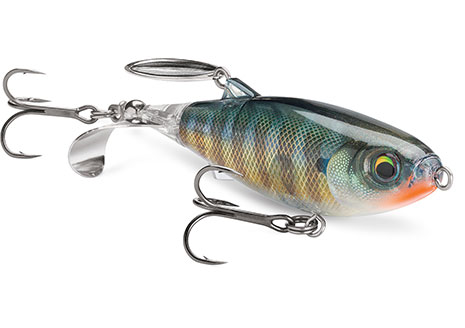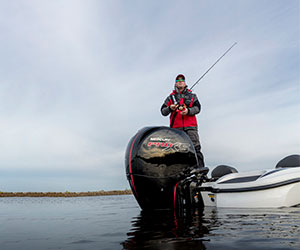
What's New?

Rain didn’t dampen the spirits of 14 Casting Couples contestants in the season finale at Magician Lake last weekend.

Man, you talk about a close finish! It doesn’t get much closer than what the Arjay’s Classic experienced at Paw Paw Lake on Saturday.

New Gear
The ClapTail™ 110 is a topwater bait with a metal prop and back blade that collide when retrieved, producing a unique two-tone fish-attracting sound.
Newsflash
Steelhead Push into Indiana; Michiana Fishing is Good for Several Species
- Details
By Louie Stout
Steelhead have been pouring into Indiana waters and that should continue with the rains the past couple of days.
During the week of March 10-17, 2,386 fish passed through the South Bend ladder and another 1,295 the past week. That brings this year’s total to 4,355.
That’s still shy of the long-term average of 7,000, and the weather could dictate if we’re able to see that many move up.
“The St. Joe and the other tributaries are dealing with clear, low water and that has hindered the run so far,” said Lake Michigan Biologist Ben Dickinson. “It’s been a challenge and we need the rain.”
Even so, rising water temperatures have several steelhead already spawning and some might be done.
Veteran Angler Lowen Earns First Bassmaster Elite Series Victory At Pickwick
- Details
B.A.S.S. Report
 Bill Lowen and family
Bill Lowen and family
FLORENCE, Ala. — Bill Lowen turned in an impressively consistent performance at the Guaranteed Rate Bassmaster Elite at Pickwick Lake, but he’ll never forget the 8-pound, 5-ounce largemouth that buoyed his Championship Tuesday performance and delivered a winning total of 83-5.
The only competitor to break 20 pounds three of the four days, Lowen placed third on Day 1 with 21-3 and improved to second a day later by adding 23-13. He earned his final-round berth on Day 3 with a limit of 17-10 that put him in a first-place tie with Chad Pipkens.
On Tuesday, Lowen surged across the finish line with a limit of 20-11. Edging second-place Brock Mosley by 2-10, Lowen claimed his first Elite win and earned $102,000, which includes the daily and overall Phoenix Boats Big Bass awards.
Lowen’s game-changing kicker bit around 10:30 a.m., when he skipped his black and blue Signature Series 3/8-ounce Lure Parts Online jig with a chunk trailer under a dock near Kogers Island. He initially snagged a piece of submerged cover, but then his line tightened.
“I had to pitch way up in there so the bait could get down in the current and sweep it through,” Lowen said. “I felt my jig get into a limb or a piece of brush, and as I hopped the jig over I felt the bite.
“I hesitated because I wanted to be sure, but when I got big pressure, I set the hook and it was game on.”
Lowen described that emotional catch: “There were so many feelings going through my head. You could hear me screaming and hollering and that’s not me. But that’s 14 years of excitement built up for this day. It all came out.”
The Tennessee Valley Authority steadily worked the volume through the system. But with Wilson Dam dumping approximately 180,000 cubic feet per second into Pickwick, the rising water and intense current dramatically changed Lowen’s game plan.
“My main goal was to start the tournament out on the grass flat by Koger Island. When all this rain and current came through I (was concerned) because I didn’t have anything else.
“The first morning of the event I ran down there and saw what was going on, and I said, ‘These fish have to slide to the sides — whether it’s on the island where I was fishing or the docks on the other side.’ Fortunately, when I pulled up and started flipping trees I got a bite, which keyed me in.”
That pattern worked for three days, but in the final round, falling water had drained much of Lowen’s prime habitat.
“Today, my main area (shallow cover on the outskirts of Kogers) was a foot and a half low,” he said. “A lot of the wood I was catching fish on was dry, so I started running some deeper stuff. I switched from the 3/8-ounce jig to a 1/2 and caught a couple key fish.”
Earlier in the tournament, Lowen used the 3/8-ounce jig so he could float it through the shallow, current-swept cover without getting hung up. He also used a Strike King Rodent Texas-rigged on a 5/0 Hayabusa flipping hook with a 5/16-ounce Reins tungsten weight for flipping reeds.
“Anytime I’m fishing current and I can keep a flipping rod in my hand, that’s my comfort zone,” Lowen said. “I grew up on the Ohio River, which looks just like (Pickwick) when it’s flooded. I’m used to rising, muddy water; it doesn’t affect me or make me get spun out. I just went out and fished the way I’d fish at home.”
Page 55 of 267













Connect With Us